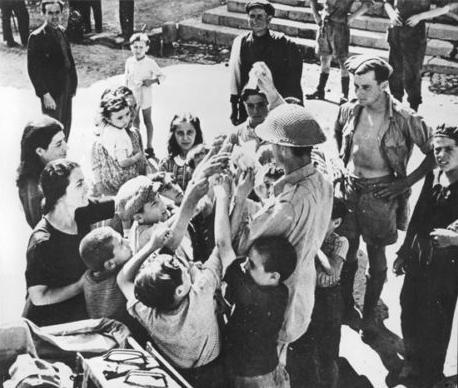
World War II Campaigns: Sicilian Public Reaction--Food

Figure 1.--The Sicilians were in bad shape bt the time the Allies arrived. Thus in additiin to defeating the Germans, the Allies were faced with precentung the sicilians from starving as well as brining a malaria epidemic under control. The press caption here read, "Allies Bring Food to Sicily: Children and adults crowd around a British soldier in Palazzolo, Sicily, to get biscuits and other food he is sharing with them from military rations. Allied forces are dustributing food to needy persons on the Italian island under the allied plan for rehabilitation of liberated territories." Palazzolo was just a few miles north of the British landing beaches along the coastl road to Messina.
|
|
Food problems on Sicily did not begin with World War II or even World War I, but were aggevated by the World War I. One author writes, "Wars had continued, with Italy's endless problems regarding territory. First the World War I; then Nussolini;'s regime, which paid more attention to the colonization of Africa thn to Sicily; and the terrible Second world warpostwar chaos and starvation ran rampant throughout the island. World War II further impoverished the Sicilians. Disease, such as malaria, was widespread; and when the allies arrived with soap and drugs , they were blessed and cheered as heoes." [Guanera, p. 392.] Since Italy entered World War II, food was rationed throughout the country including Sicily. The War adverseky affected the availability of food. Military conscription reduced available farm labor. It also prevented food imports. Italy was not self sufficient in food production. This reducing already limited diets which hit the poor regions like Sicily harder than more prosperous regions. Many Sicilians did not have the money to but on the black market. And as the war went against Italy, ration allocations steadily fell. It was often difficult to obtain even the ration allocations. The Sicilian economy was mostly agricultural and still is. This would suggest that Sicilians were better off than urbn Italians. Farming methods on Sicily, however, were very inefficient and thus poductivity extremely low. Much of the land was owned by large estates. Fishing was also imprtant on Sicily, but dversely affected by fuel shortages and the war time dangers in operating at sea. With the landings, the food system totally broke down. Many Sicilians were thus in desperate circumstances by the time the Allies arrived. Solders shared their rations, especially with the children. Children and women were reduced to scrambling for the food in U.S. Army garbage. Some offered what little they had, from hazel nuts to grapes, to the advancing soldiers. As the Allied advanced they were left with the responsibility of feeding a hungry population.
Sources
Guarnera, Rosemary Valenti. Me and the General (Xlibris Corporation: 2014), 520p.
CIH -- WW II

Navigate the CIH World War II Section:
[Return to Main Sicilian public reaction page]
[Return to Main Sicilian campaign page]
[Return to Main Italian campaign page]
[Return to World War II European campaign second phase page]
[Biographies]
[Campaigns]
[Children]
[Countries]
[Deciding factors]
[Diplomacy]
[Geo-political crisis]
[Economics]
[Home front]
[Intelligence]
[POWs]
[Resistance]
[Race]
[Refugees]
[Technology]
[Totalitarian powers]
[Bibliographies]
[Contributions]
[FAQs]
[Images]
[Links]
[Registration]
[Tools]
[Return to Main World War II page]
[Return to Main war essay page]
Created: 10:41 PM 8/16/2016
Last updated: 10:41 PM 8/16/2016



